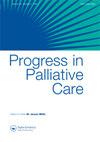‘Permission to be kind to myself’. The experiences of informal carers of those with a life-limiting or terminal illness of a brief self-compassion-based self-care intervention
IF 0.8
Q4 PUBLIC, ENVIRONMENTAL & OCCUPATIONAL HEALTH
引用次数: 3
Abstract
Background Informal carers of someone with a life-limiting or terminal illness often experience marked levels of depression, anxiety and stress. Carers have limited free time to devote to lengthy, well-being interventions. Carers also struggle to prioritize their self-care, a factor which may help buffer some of the negative impacts of being a carer. The aim of this study was to gain insight into carers’ views and perceptions of a brief, four session face to face self-compassion intervention for carers (iCare) which was created to improve well-being, increase self-compassion and develop self-care among carers. In so doing, this qualitative research addresses gaps in the literature relating to self-compassion interventions for carers and targeted self-care initiatives for carers. Method Semi-structured interviews with nine participants of iCare were conducted and data subjected to a reflexive thematic analysis within a critical realist framework. Findings A number of themes and sub-themes were identified. Carers discovered a kinder, less judgemental way of seeing themselves allowing themselves to recognize that they had their own individual needs. In turn this led to an intentional practise of self-care activities. Benefits from conscious self-care and self-kindness included experiencing a greater sense of calm or relaxation and the development of a more positive outlook. Conclusion The findings highlight that a brief self-compassion intervention can have a positive impact on carers reported well-being through developing a kindlier internal orientation and locating a permission to allow themselves to practise an intentional self-care.“允许善待自己”。非正规护理人员对生命受限或绝症患者进行短暂的基于自我同情的自我护理干预的经历
背景患有限制生命或绝症的人的非正式护理人员通常会经历显著程度的抑郁、焦虑和压力。护理人员的空闲时间有限,无法投入到漫长的幸福干预中。护理人员也很难优先考虑自我护理,这一因素可能有助于缓冲作为护理人员的一些负面影响。本研究的目的是深入了解护理人员对护理人员面对面自我同情干预(iCare)的看法和看法,该干预旨在改善护理人员的幸福感、增强自我同情和发展自我护理。通过这样做,这项定性研究解决了与护理人员的自我同情干预和护理人员有针对性的自我护理举措有关的文献中的空白。方法对iCare的9名参与者进行半结构化访谈,并在批判性现实主义框架内对数据进行反射性主题分析。确定了一些主题和分主题。护理人员发现了一种更友善、更少评判的方式来看待自己,让自己认识到自己有自己的个人需求。这反过来又导致了有意识地进行自我保健活动。有意识的自我照顾和自我友善的好处包括体验更大的平静或放松感,以及发展更积极的观点。结论研究结果强调,短暂的自我同情干预可以通过培养更友善的内部导向和找到允许自己进行有意自我护理的许可,对护理人员报告的幸福感产生积极影响。
本文章由计算机程序翻译,如有差异,请以英文原文为准。
求助全文
约1分钟内获得全文
求助全文
来源期刊

PROGRESS IN PALLIATIVE CARE
PUBLIC, ENVIRONMENTAL & OCCUPATIONAL HEALTH-
CiteScore
2.60
自引率
11.80%
发文量
24
期刊介绍:
Progress in Palliative Care is a peer reviewed, multidisciplinary journal with an international perspective. It provides a central point of reference for all members of the palliative care community: medical consultants, nurses, hospital support teams, home care teams, hospice directors and administrators, pain centre staff, social workers, chaplains, counsellors, information staff, paramedical staff and self-help groups. The emphasis of the journal is on the rapid exchange of information amongst those working in palliative care. Progress in Palliative Care embraces all aspects of the management of the problems of end-stage disease.
 求助内容:
求助内容: 应助结果提醒方式:
应助结果提醒方式:


